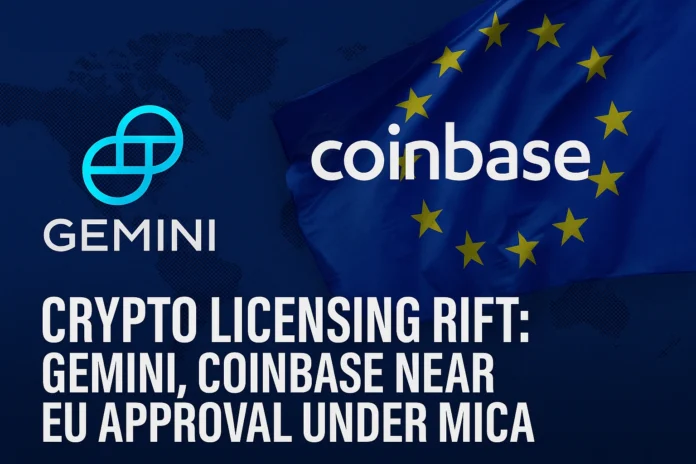In a monumental development for the crypto industry, two of the world’s leading cryptocurrency exchanges—Gemini and Coinbase—are inching closer to securing regulatory approval under the European Union’s Markets in Crypto-Assets (MiCA) framework. This represents a pivotal moment not just for the companies themselves, but for the evolving landscape of global crypto regulation.
As the EU tightens its grip on digital asset markets, the move is being seen as both a challenge and an opportunity. The Crypto Licensing Rift has exposed differing strategic approaches, national-level interpretations, and what lies ahead for other market players who want a piece of Europe’s growing crypto economy.
What Is MiCA and Why Does It Matter?
MiCA (Markets in Crypto-Assets) is the EU’s sweeping new regulation aimed at standardizing and safeguarding crypto activity across all 27 member states. Scheduled for full implementation in 2025 (with key parts already rolling out in 2024), it covers:
-
Issuance and trading of crypto assets
-
Rules for stablecoins
-
Operational and capital requirements for crypto companies
-
Consumer protection and anti-money laundering measures
MiCA aims to create a unified market for crypto companies while establishing strong investor protections—a much-needed clarity for a previously fragmented European crypto scene.
The Licensing Rift: Gemini vs. Coinbase
Both Gemini and Coinbase have been vocal about their commitment to regulation, but their paths under MiCA have diverged slightly, giving rise to what industry insiders call a “Crypto Licensing Rift.”
Gemini’s Strategy:
-
Gemini is reportedly applying for MiCA approval via Ireland, where it already holds an e-money license and operates as a Virtual Asset Service Provider (VASP).
-
The firm has focused on regulatory harmony, aligning with EU expectations and leveraging its reputation for compliance-first growth.
Coinbase’s Position:
-
Coinbase, already operating across several European markets, is pushing aggressively through Germany and Ireland.
-
The company is also dealing with a complex regulatory environment in the U.S., making its MiCA approval a priority to establish European strength amid American uncertainty.
This rift showcases how global crypto exchanges are strategically navigating differing national-level interpretations of MiCA to secure their European footprint.
Why Is EU Approval So Crucial?
The EU represents one of the world’s largest and most stable economies. Gaining approval under MiCA means:
-
Pan-European Access: Firms can passport their license across all EU countries.
-
Regulatory Legitimacy: Being MiCA-compliant assures users and investors of safety and trust.
-
Competitive Edge: Early compliance can help companies dominate markets while others scramble to adapt.
Gemini and Coinbase are not just securing licenses—they are positioning themselves to become the default crypto providers for 450 million EU residents.
The Global Ripple Effect
The crypto world is watching closely. MiCA is fast becoming a template for other jurisdictions, such as the UK, Singapore, and Australia, as they develop their own comprehensive crypto frameworks. Early movers like Gemini and Coinbase could gain first-mover advantages, shaping best practices and influencing upcoming laws worldwide.
Industry Reactions
The potential approval of Gemini and Coinbase under MiCA has stirred a range of reactions:
-
Supporters see this as a turning point for mainstream adoption and institutional confidence.
-
Skeptics warn that overly rigid regulation could stifle innovation, particularly among smaller crypto startups.
-
Competitors like Binance and Kraken are reportedly fast-tracking their own MiCA compliance efforts to avoid losing ground.
Challenges Ahead
Even with the promise of MiCA, challenges remain:
-
Regulatory Complexity: Each member state has its own financial authority, and interpreting MiCA uniformly may not be as simple as it looks.
-
Technology Adaptation: Exchanges must ensure their platforms meet operational, security, and reporting standards.
-
User Education: Firms must inform their users of the changes that MiCA introduces, especially around privacy, wallet services, and KYC requirements.
The Crypto Licensing Rift isn’t just about paperwork—it’s about transformation. Exchanges need to evolve rapidly to remain compliant and competitive.
What’s Next?
As of mid-2025, both Coinbase and Gemini are nearing the final stages of the approval process. If successful, their licensure could be announced within the next quarter, opening the door for:
-
Expanded services like staking, DeFi integrations, and fiat-crypto onramps
-
Broader institutional partnerships
-
Mergers and acquisitions of local European crypto platforms
This will mark a new chapter in the post-regulatory era of crypto—one where consumer protection, innovation, and legitimacy coexist.
Final Thoughts
The race for MiCA compliance is more than just a licensing formality—it’s a test of the crypto industry’s ability to mature and align with global financial norms. As Gemini and Coinbase edge closer to approval, they are not only navigating a regulatory maze but also leading a revolution in how crypto is integrated into the global financial system.
The Crypto Licensing Rift may seem like a competition between two giants, but its implications ripple across the ecosystem. For users, investors, startups, and regulators, this marks the dawn of a more structured, transparent, and inclusive crypto world—starting in Europe, but sure to echo worldwide.
Read more: decoradyard garden tips by decoratoradvice
FAQs
Q1: What is MiCA and how will it affect crypto users in the EU?
A: MiCA is the EU’s framework for regulating crypto-assets. It brings uniformity and protection for users, making trading and investing safer while giving companies a consistent set of rules.
Q2: Why is there a “Crypto Licensing Rift” between Gemini and Coinbase?
A: The rift refers to their differing approaches to securing MiCA licenses—Gemini through Ireland’s VASP framework, and Coinbase through both Germany and Ireland. It shows the strategic variance in navigating EU regulations.
Q3: What does MiCA mean for crypto companies outside the EU?
A: MiCA sets a global standard. Non-EU companies must adapt if they want to access Europe’s market legally. Those who comply early, like Gemini and Coinbase, gain a major advantage in the global regulatory race.
Read more:

